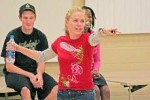‘Improv’-ing skills

Freshmen at USF will learn a lot about business from a textbook, but professors in the College of Business Administration have realized that communication skills need to be used out loud.
An unusual improvisation – or improv – class does exactly that: Freshman business students are forced to think fast, be active and pay attention to each other through a series of games.
“They’re definitely silly but they’re helpful and positive,” said Paul Roche, a freshman majoring in business marketing.
Fall 2007 was the first semester USF offered a business improv class, said Katie Elverson, an academic advisor and coordinator for the Business Living Learning Community (BLCC).
The BLLC places freshmen in the same academic program in the same residence hall.
“By pairing these freshmen all together, who instantly have this common bond, it’ll help them to be more successful and be a support group for each other,” Elverson said.
To get into the class, freshmen must be accepted into the Bulls Business Network.
Of the students living in Maple Hall, 28 are enrolled the course this semester.
Aixa Del Toro, a freshman majoring in marketing, said it’s a tight-knit community.
“Everyone knows each other here,” Del Toro said. “At the least, someone is always stopping in to say ‘hi.'”
Kari Goetz, a former comedy improv artist from Los Angeles, teaches the class once a month for two hours. When she’s not there, she’s working at the Tampa Bay Performing Arts Center.
Goetz got her start as a business teacher when she met Robert Forsythe, dean of the College of Business Administration, at a luncheon.
They starting talking about improvisation and how business students could use it, and came up with the idea for the class.
Although the class isn’t mandatory, Elverson said most of the students show up regularly.
At Tuesday’s meeting, the turnout was a little low at first, but a couple of students made phone calls to rile up the rest of the group. After some networking, attendance increased.
Students started the class with a game of “Big Booty.”
Standing in a circle, students practiced their listening skills by waiting for someone to call out their number. If they messed up by saying their number or another person’s number, they started again.
During another game, the group counted to 20. If two people said a number at the same time, they had to start over.
Later, they broke into pairs and took on the role of different characters, from Julius Caesar to the Marlboro man. They had to describe what a “grundle” is, an imaginary word, by improvising without using the word “no.”
Toni Russell, a freshman majoring in accounting, said the games teach herteamwork.
“We have to all be on one page,” she said. “If one person was talking or making any sort of noise, we’d all be off.”
Goetz said the games also help with focus, eye contact and communication.
“If you can get a team together before they have to do a presentation to play these games first, they’re much more likely to be in agreement,”she said.
The improv class is helpful for someone who is shy or nervous about public speaking, students and professors say.
“You become more used to talking in front of people,” said Eric Holland, a freshman majoring in finance.
Five students had to explain an expertise that the rest of the students assigned to them. One was an expert syrup maker; another, a tap dancer. Students listening to the panel asked the experts questions.
Goetz says the purpose of the expert panel is for students to learn how to think on their feet and make the most of every situation, such as when writing a book report at the last minute.
Even students who aren’t studying business can benefit from using improv skills.
“No matter what your job is, no matter what you’re doing, you need good communication skills,” Elverson said.






